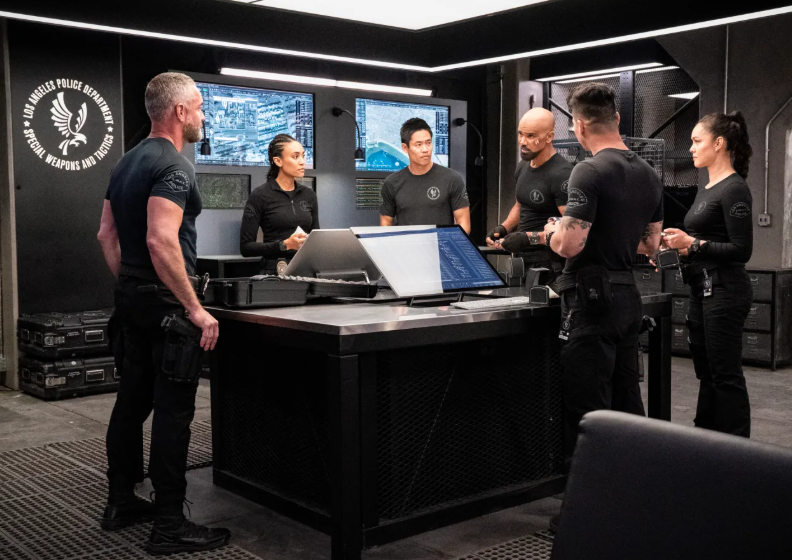The journey of the S.W.A.T. television series has been nothing short of a dramatic odyssey, mirroring the high-stakes action it portrays. Over the past two years, the dedicated fanbase has navigated a turbulent emotional rollercoaster, experiencing the series’ cancellation not once, but thrice, each instance followed by an equally surprising resurrection. This remarkable resilience—a testament to its enduring popularity and profitability—culminated in the most recent and perhaps most unexpected development: the announcement of a new spinoff, S.W.A.T. Exiles. This news arrived just three days after the original series’ latest (and purportedly final) episode aired, signifying that the S.W.A.T. universe, as one co-creator quipped, was “dead for less than 48 hours.”
Headlining S.W.A.T. Exiles is the franchise’s cornerstone, Shemar Moore, reprising his iconic role as Daniel “Hondo” Harrelson. The new 10-episode series, born from Sony Pictures Television, promises a fresh direction with Jason Ning (Lucifer) at the helm as showrunner and filming slated to commence in Los Angeles this summer, the same city that served as the backdrop for the original series. However, the speed with which Exiles materialized—a whirlwind process driven by strategic business objectives—led to a degree of chaos behind the scenes. The swift progression meant that the news caught most of the original S.W.A.T. cast and writers by surprise, with many learning about the spinoff just days before the public announcement, and some feeling alienated by the lack of direct communication from the studio. Even CBS, which had aired the flagship series for eight seasons, was reportedly not given a heads-up, discovering the spinoff concurrently with the official public announcement. Sources indicate that Sony Television executives have since issued apologies for the oversight in communication, attributing it to the unprecedented pace of development.
The rapid greenlight for Exiles was motivated by a confluence of critical factors. Sony Television aimed to leverage the annual LA Screenings to secure international and domestic buyers for the new series, a crucial step for a franchise that has consistently enjoyed robust international sales, making it a profitable venture despite modest license fees from network broadcasters. Furthermore, the studio was keen to capitalize on a narrow window of opportunity to retain Shemar Moore, a pivotal figure in the franchise’s success, and to keep the S.W.A.T. production soundstages and its 200-person Los Angeles-based crew employed. This strategic move allowed the studio to circumvent a lengthier traditional development cycle, fast-tracking Exiles directly to series. While Shawn Ryan, the original series’ co-creator and former showrunner, is under an exclusive overall deal elsewhere and thus not directly involved, he was reportedly aware of the fast-tracked plans for a Moore-led spinoff.

Initial fan excitement over the continuation of the S.W.A.T. narrative, and industry praise for Sony TV’s commitment to employment, quickly mingled with a brewing chorus of questions and criticism regarding the composition of the new unit. The core premise of Exiles sees Hondo leading “a last-chance experimental S.W.A.T. unit made up of untested, unpredictable young recruits.” This creative direction, while offering fresh narrative possibilities and potentially more dynamic, character-driven storylines, also serves as a clear strategy to manage talent costs by surrounding Moore with emerging actors rather than the established, higher-salaried original cast members. This decision, however, did not resonate well with a segment of the devoted fanbase, who voiced strong desires for other beloved original characters, particularly Jay Harrington’s popular Deacon, to join Hondo in the spinoff.
Shemar Moore, a vocal advocate for the series throughout its previous cancellation battles, addressed the fan and cast reactions directly in an Instagram video. In a passionate defense of the new direction, he touted Exiles as “bigger, bolder, S.W.A.T. on steroids.” Employing a football metaphor, Moore asserted his role as the “quarterback” of S.W.A.T., acknowledging his past castmates as a “strong squad, a family, a team,” and expressing his love and appreciation for them. He pragmatically noted that while “tight ends get traded, the running back gets traded, the receivers get traded, but the teams keep pushing with their quarterback and I’m that guy.” This statement, while perhaps blunt, underscored his long-standing commitment to the franchise and his relentless efforts to ensure its survival. Sources close to Moore confirmed his loyalty to his former colleagues and crew, highlighting his consistent advocacy for the show through its multiple near-deaths.
The passionate S.W.A.T. fandom has historically played a crucial role in keeping the series alive, their vocal support influencing Sony TV’s decision to proceed with a spinoff. As such, their opinion, especially concerning the solo return of Hondo, holds significant weight. While the new series remains in its nascent creative stages, and there are currently no concrete plans for other original S.W.A.T. cast members to feature regularly, the possibility of alums appearing in some capacity, potentially as guest stars, remains open. The success of Exiles will heavily depend on how effectively it balances new character dynamics with the legacy of the original series. The initial interest from buyers both domestically and internationally suggests confidence in the S.W.A.T. brand’s global appeal. Interestingly, CBS, the long-time network home of the original series, has not been approached and is not expected to pursue the spinoff, further emphasizing Sony’s independent vision for the franchise’s future. The journey of S.W.A.T. has always been one of surprising turns and tenacious survival, and S.W.A.T. Exiles represents its boldest step yet into an expanded, revitalized universe.





